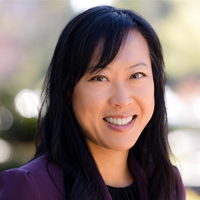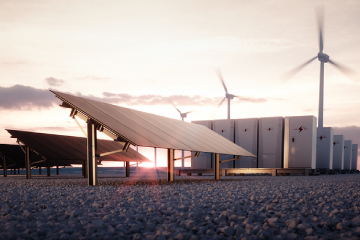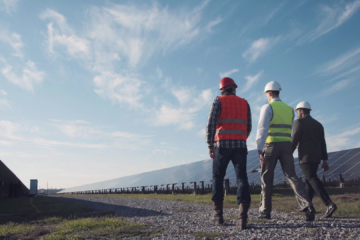- About UsAbout UsWe’re committed to providing future generations with the means to power their lives in the most economic, environmental and socially responsible ways possible.
- What We DoWhat We DoWe are a market-leading, independent power producer and service provider, delivering: wind (onshore and offshore), solar photovoltaic, storage, and electrical vehicle charging.
- Landowners
- Suppliers
- Projects
- Careers
- News
- Contact
Going Beyond the Metrics

By Tina Chen, Vice President, Human Resources
When I joined EDF Renewables in early 2022, I was excited to accept the role because I saw it as a unique “right place, right time” opportunity to take an already forward-looking company to the next level by deepening and enhancing its diversity, equity and inclusion (DEI) programs and policies.
For the past year, my focus has been on going beyond the metrics and digging deeper to really embed inclusion and belonging in EDF Renewables’ culture. If we believe that DEI is important in our organization, we must create a sense of inclusiveness so that when we recruit women, people of color, or others with diverse backgrounds, these individuals feel they’re in an environment in which they can thrive.
As we work to create that, surveys that measure employee sentiments help us determine our progress towards an inclusive workplace where employees feel like they are represented. We spend a lot of time at work, and it’s important to cultivate an atmosphere in which everyone feels they belong and that their differences and contributions are valued.
A key initiative to foster inclusion is our employee resource groups (ERG). Our initial ERG, Power in Diversity, was created in 2019, and we’re continuing to build upon that foundation by adding ERGs for women and Veterans. These groups are open to anyone and offer a forum to explore important issues and the ways in which they may impact each of us differently.
We’ve also aligned ourselves with the three DEI pillars of American Clean Power’s Energy Transition for All (ET4All) initiative, namely:
- expanding opportunities for workers,
- creating value for communities, and
- leading in diversity, equity, and inclusion.
While these principles have always shaped how EDF Renewables operates, the decision to align with ET4All more intentionally has increased our focus in these areas. One example of this is the creation of a diversity business council, which will have representatives from across the company and will explore ways to formally embed DEI into our business strategy and decisions.
Another element we’ve introduced is DEI training and education, including unconscious bias training, for team members at all levels throughout the organization. One thing I request of all our guest facilitators is that they push people out of their comfort zones. I want these sessions to be thought provoking and generate meaningful insights. When people are forced to challenge their assumptions, it helps everyone feel seen and heard – even those in underrepresented groups.
What I don’t want is for our DEI efforts to be performative. Metrics such as data on new hires, workforce diversity and turnover have their place, but they’re meaningless unless they are presented and evaluated in context. I want to focus on what matters to the organization and how we’re tracking progress on those items. If something is important, then the work we do around it has to add value. If it matters, we must integrate it into the fabric of how we do business.
To be certain, EDF Renewables has always embraced individual differences, and our egalitarian culture combined with our international footprint may have helped us be more diverse than our industry peers as well as the energy industry as a whole. But that doesn’t necessarily mean we’ve achieved inclusion, and that’s my main focus.
As a female and an Asian, inclusivity has been a topic of interest for me throughout my life and career. I’m a first generation American, having moved to the US with my parents at the age of seven. In those days, differences weren’t exactly celebrated. The emphasis was on assimilation, and there was an expectation that newcomers would let go of their prior culture and language – so much so that as an adult, I am not fully fluent in my mother tongue of Mandarin. Fortunately, things have changed, and today it’s much more common to celebrate multicultural heritage.
I earned a doctorate in psychology, and my Ph.D. thesis examined whether there was a glass ceiling for women and people of color in the life sciences field. I started my career at Sempra Energy, where I held two DEI-specific roles and launched the first employee diversity group as well as that organization’s diversity mentoring program. When I joined EDF Renewables, I felt I arrived at a pivotal moment in the company’s evolution, in a role that feels like the culmination of many years of work.
Much of 2022 was spent laying the foundation for meaningful changes in how EDF Renewables will approach DEI in 2023 and beyond. This is an area of intense focus in our industry as well as within our company. We want to be the employer of choice, and this means demonstrating that everyone has equal opportunity here. It goes further, though – we not only want people to see the potential for career growth, but also that we will set them up for success as they move to next level, especially if that means they will be managing others.
Central to these efforts is our Sustainable Leadership program, which provides coaching and mentoring to help employees from all backgrounds make the transition from being an individual contributor to being a leader. This supports inclusivity as we provide tools for all team members to advance their careers, but it also ensures they are equipped to help others follow in their footsteps.
I’ve spent my career in the energy industry, and while things have changed over the years, progress has been incremental. It’s inspiring to know that momentum is building, and our company, our industry and hopefully the country are poised to make big strides in inclusivity. It is deeply fulfilling to be in a position to drive these efforts forward.
- © 2024 EDF Renewables North America
- Privacy Policy
- AB 1305 Disclosure
- TCFD Report

